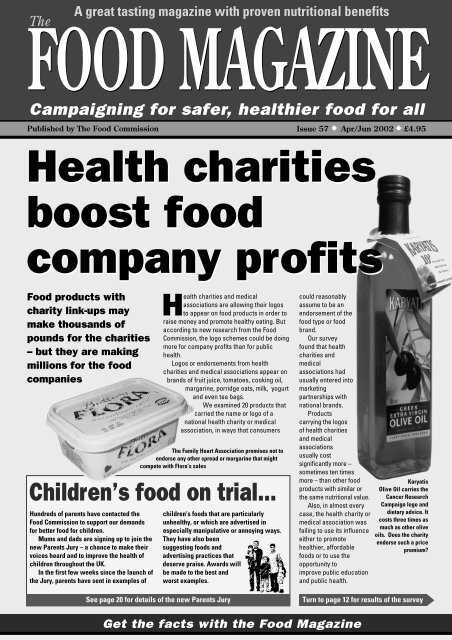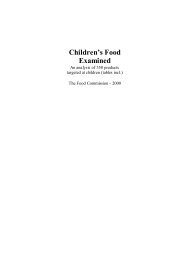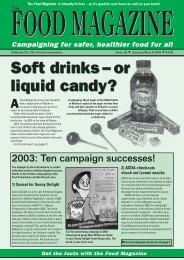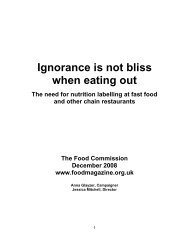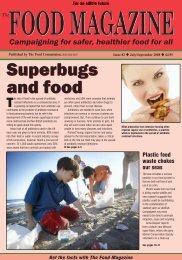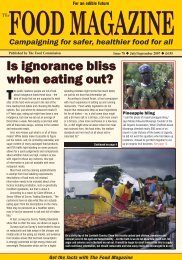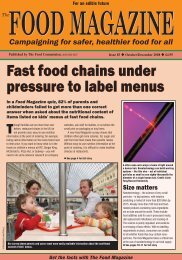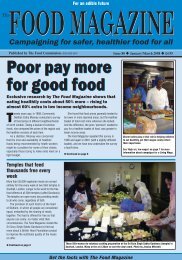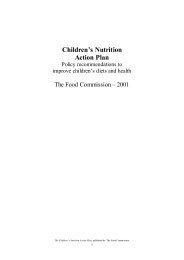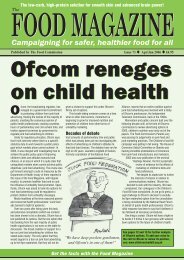to view original article from The Food Magazine
to view original article from The Food Magazine
to view original article from The Food Magazine
You also want an ePaper? Increase the reach of your titles
YUMPU automatically turns print PDFs into web optimized ePapers that Google loves.
A great tasting magazine with proven nutritional benefits<br />
<strong>The</strong><br />
FOOD MAGAZINE<br />
Campaigning for safer, healthier food for all<br />
Published by <strong>The</strong> <strong>Food</strong> Commission<br />
Issue 57 ◆ Apr/Jun 2002 ◆ £4.95<br />
Health charities<br />
boost food<br />
company profits<br />
<strong>Food</strong> products with<br />
charity link-ups may<br />
make thousands of<br />
pounds for the charities<br />
– but they are making<br />
millions for the food<br />
companies<br />
Hundreds of parents have contacted the<br />
<strong>Food</strong> Commission <strong>to</strong> support our demands<br />
for better food for children.<br />
Mums and dads are signing up <strong>to</strong> join the<br />
new Parents Jury – a chance <strong>to</strong> make their<br />
voices heard and <strong>to</strong> improve the health of<br />
children throughout the UK.<br />
In the first few weeks since the launch of<br />
the Jury, parents have sent in examples of<br />
Health charities and medical<br />
associations are allowing their logos<br />
<strong>to</strong> appear on food products in order <strong>to</strong><br />
raise money and promote healthy eating. But<br />
according <strong>to</strong> new research <strong>from</strong> the <strong>Food</strong><br />
Commission, the logo schemes could be doing<br />
more for company profits than for public<br />
health.<br />
Logos or endorsements <strong>from</strong> health<br />
charities and medical associations appear on<br />
brands of fruit juice, <strong>to</strong>ma<strong>to</strong>es, cooking oil,<br />
margarine, porridge oats, milk, yogurt<br />
and even tea bags.<br />
We examined 20 products that<br />
carried the name or logo of a<br />
national health charity or medical<br />
association, in ways that consumers<br />
<strong>The</strong> Family Heart Association promises not <strong>to</strong><br />
endorse any other spread or margarine that might<br />
compete with Flora’s sales<br />
Children’s food on trial...<br />
children’s foods that are particularly<br />
unhealthy, or which are advertised in<br />
especially manipulative or annoying ways.<br />
<strong>The</strong>y have also been<br />
suggesting foods and<br />
advertising practices that<br />
deserve praise. Awards will<br />
be made <strong>to</strong> the best and<br />
worst examples.<br />
See page 20 for details of the new Parents Jury<br />
could reasonably<br />
assume <strong>to</strong> be an<br />
endorsement of the<br />
food type or food<br />
brand.<br />
Our survey<br />
found that health<br />
charities and<br />
medical<br />
associations had<br />
usually entered in<strong>to</strong><br />
marketing<br />
partnerships with<br />
national brands.<br />
Products<br />
carrying the logos<br />
of health charities<br />
and medical<br />
associations<br />
usually cost<br />
significantly more –<br />
sometimes ten times<br />
more – than other food<br />
products with similar or<br />
the same nutritional value.<br />
Also, in almost every<br />
case, the health charity or<br />
medical association was<br />
failing <strong>to</strong> use its influence<br />
either <strong>to</strong> promote<br />
healthier, affordable<br />
foods or <strong>to</strong> use the<br />
opportunity <strong>to</strong><br />
improve public education<br />
and public health.<br />
Karyatis<br />
Olive Oil carries the<br />
Cancer Research<br />
Campaign logo and<br />
dietary advice. It<br />
costs three times as<br />
much as other olive<br />
oils. Does the charity<br />
endorse such a price<br />
premium?<br />
Turn <strong>to</strong> page 12 for results of the survey<br />
Get the facts with the <strong>Food</strong> <strong>Magazine</strong>
CHECKOUT<br />
Special report on the food companies that benefit by<br />
associating themselves with charitable or medical causes...<br />
Cause or<br />
compromise?<br />
Health claims on food products<br />
may make you feel sceptical. But<br />
add the trusted logo of a health<br />
charity or medical association and<br />
you may be more likely <strong>to</strong> buy the<br />
product. <strong>The</strong> <strong>Food</strong> Commission’s<br />
latest research shows that your<br />
trust might be misplaced.<br />
Browse the shelves of any<br />
supermarket and you’ll find healthy<br />
sounding claims attached <strong>to</strong> almost<br />
every type of food. Health-related<br />
descriptions appear on a diverse selection of<br />
products, <strong>from</strong> tinned spaghetti, margarine,<br />
cereals, jelly sweets, tinned fish and fruit, <strong>to</strong><br />
squash, bread, tea bags, processed cheese<br />
and chocolate.<br />
Some descriptions boast of the presence<br />
of a particular nutrient, such as calcium;<br />
some products proclaim added vitamins;<br />
others claim benefits for particular organs of<br />
the human body, or a reduced risk of disease<br />
by eating the food regularly. Some of these<br />
claims are backed up by scientific evidence.<br />
Others are not, and contribute <strong>to</strong> much<br />
confusion over food and health.<br />
In order <strong>to</strong> stand out amid this clamour of<br />
claims, endorsements (or apparent<br />
endorsements) are often used by food<br />
marketers <strong>to</strong> add weight and authority <strong>to</strong><br />
their claim, and <strong>to</strong> make one brand seem<br />
superior <strong>to</strong> others. Currently, heart-health<br />
claims on Nestlé Cheerios cereal are<br />
reinforced by BBC TV science reporter<br />
Judith Hann; the bone-health benefits of<br />
Osteocare calcium supplements are<br />
promoted in association with the English<br />
National Ballet; and Olympic rower Steve<br />
Redgrave tells of his remarkable recovery<br />
<strong>from</strong> high cholesterol levels in order <strong>to</strong> help<br />
sell Flora Pro.Activ margarine.<br />
Over the past year, the <strong>Food</strong> Commission<br />
has been moni<strong>to</strong>ring new endorsement-style<br />
marketing techniques popular with<br />
food manufacturers. <strong>The</strong>se are in<br />
the form of marketing partnerships<br />
between food companies and<br />
health charities or medical<br />
associations.<br />
A charity such as the<br />
British Heart Foundation, or a<br />
medical association such as<br />
the National Osteoporosis<br />
Society, enters in<strong>to</strong><br />
partnership with food<br />
companies and allows the<br />
organisation’s logo <strong>to</strong> appear<br />
on food products. Sometimes<br />
these marketing partnerships<br />
take the form of simple<br />
donation schemes. Here, the<br />
food company donates money<br />
<strong>to</strong> a health charity or cause in<br />
return for using the<br />
organisation’s logo on food<br />
packaging <strong>to</strong> announce its<br />
public good will. In other<br />
schemes, the link-up between<br />
the two organisations is used<br />
<strong>to</strong> make, imply or reinforce a claim for the<br />
health benefits of consuming the food.<br />
<strong>The</strong> common and critical fac<strong>to</strong>r is that any<br />
marketing claims for the health benefits of<br />
the food product are strengthened by the<br />
trust that people have in these health<br />
charities for offering impartial advice on<br />
health matters.<br />
Yet, as not-for-profit organisations enter<br />
in<strong>to</strong> commercial relationships with food<br />
companies, questions start <strong>to</strong> arise. Are the<br />
claims supported by these marketing<br />
partnerships scientifically<br />
substantiated? Are they<br />
trustworthy? Who is making<br />
the health statements –<br />
the company or the<br />
health charity or<br />
medical association? If<br />
a logo appears on the<br />
food packaging, what<br />
exactly does it<br />
represent? Did a fee<br />
change hands, and if so,<br />
did this compromise the<br />
accuracy of the claims?<br />
Does the food carrying<br />
the logo offer the best<br />
health benefits<br />
available? And, crucially,<br />
will following the advice<br />
help people stay<br />
healthy?<br />
<strong>The</strong> British Dietetic Association helps <strong>to</strong> promote pressed fruit juices in<br />
Safeway and Marks & Spencer that cost between 1.5 and 5.4 times as<br />
much as other pure fruit juices. Whilst the BDA does good work, the<br />
unintended implication here is that we should spend more <strong>to</strong> stay healthy.<br />
<strong>Food</strong> <strong>Magazine</strong> 57 11<br />
Apr/Jun 2002
CHECKOUT<br />
Charity logos<br />
for sale<br />
A<strong>Food</strong> Commission study of food<br />
products displaying the names or<br />
logos of health charities and medical<br />
associations has found considerable cause<br />
for concern.<br />
Some charities let their logos appear on<br />
foods of doubtful nutritional benefit, yet give<br />
the impression that the foods are protective<br />
against cancer or heart disease. <strong>The</strong> British<br />
Heart Foundation logo appears on Tetley tea<br />
bags alongside claims for the heart-health<br />
benefits of drinking Tetley tea. Yet the links<br />
between tea and heart health have not yet<br />
been scientifically proven, and the scientific<br />
evidence that does exist points <strong>to</strong> antioxidant<br />
benefits <strong>from</strong> green tea. <strong>The</strong> British Heart<br />
Foundation says that although its name and<br />
logo appear on tea, this should not be taken<br />
as a health endorsement, and the charity does<br />
not recommend drinking tea <strong>to</strong> improve heart<br />
health. Yet the combination of heart logos,<br />
heart-health claims and the charity’s logo<br />
gives a strong impression that Tetley tea is<br />
beneficial for the heart.<br />
Some charities allow their logo <strong>to</strong> appear<br />
on a food product simply because the food<br />
company has donated money <strong>to</strong> their cause,<br />
yet the logos are used <strong>to</strong> make an implicit<br />
health claim for the product. For instance, the<br />
World Heart Federation’s name and logo<br />
appears prominently on Kellogg’s Bran Flakes<br />
and Fruit’n Fibre. Yet there is no statement <strong>to</strong><br />
tell cus<strong>to</strong>mers that the relationship between<br />
the company and the charity is purely<br />
financial. <strong>The</strong> impression is that the World<br />
Heart Federation is encouraging people <strong>to</strong> eat<br />
Kellogg’s Bran Flakes, for the good of their<br />
hearts. Although the World Heart Federation<br />
recommends eating increased amounts of<br />
fruit and vegetables, and some wholegrain<br />
cereals, it doesn’t recommend Bran Flakes or<br />
Fruit’n Fibre or any bran-enriched foods. <strong>The</strong><br />
World Heart Federation says that this logo<br />
scheme is not a product endorsement.<br />
In almost every case, the health charities<br />
and medical associations fail <strong>to</strong> use their<br />
influence <strong>to</strong> promote foods that would offer<br />
greater health benefits <strong>to</strong> consumers. <strong>The</strong><br />
British Dental Association, for instance, helps<br />
<strong>to</strong> promote Ribena ToothKind but not milk or<br />
water. <strong>The</strong> car<strong>to</strong>n even carries the statement<br />
‘<strong>The</strong> only drink accredited by the British<br />
Dental Association’. <strong>The</strong> National<br />
Osteoporosis Society’s logo appears on<br />
Müller Crunch Corner yogurts. Calcium-rich<br />
yogurt is only a part of this product which also<br />
includes a big helping of sugars and other<br />
ingredients. Yet less sugary fruit yogurts and<br />
plain yogurts do not carry the National<br />
Osteoporosis Society logo. Are these medical<br />
associations doing the very best job they can<br />
<strong>to</strong> promote better health?<br />
We think not.<br />
We found that health<br />
charities and medical<br />
associations frequently<br />
help food companies <strong>to</strong><br />
make exclusive claims<br />
about the health benefits<br />
of branded products, even<br />
though equivalent (usually<br />
cheaper) products are<br />
available. <strong>The</strong> Family<br />
Heart Association logo, for instance, appears<br />
on packets of Quaker Oats alongside hearthealth<br />
claims for the product. <strong>The</strong> packets do<br />
not carry any indication that the relationship<br />
between the charity and the company is an<br />
exclusive contract that restricts the Family<br />
Heart Association <strong>from</strong> promoting other oat<br />
products. What should a consumer<br />
understand? That other, less expensive, oats<br />
aren’t as good for their heart as Quaker oats?<br />
Most charities know that people on a lowincome<br />
are most likely <strong>to</strong> suffer <strong>from</strong> serious<br />
between the<br />
regula<strong>to</strong>ry cracks<br />
Two national re<strong>view</strong>s of food labelling and<br />
logo schemes are underway, organised by<br />
the <strong>Food</strong> Standards Agency as part of its<br />
Labelling Action Plan. One looks at farming<br />
assurance schemes (e.g. Freedom <strong>Food</strong>s<br />
and the Little Red Trac<strong>to</strong>r logo). <strong>The</strong> other<br />
examines voluntary labelling schemes in<br />
supermarkets (e.g. terms such as ‘suitable<br />
for vegetarians’ and ‘fair trade’). Logos and<br />
endorsements by health charities and<br />
medical associations are generally<br />
unders<strong>to</strong>od <strong>to</strong> fall under the remit of the<br />
Joint Health Claims Initiative – a body set up<br />
by the consumer group Sustain in<br />
partnership with the industry’s <strong>Food</strong> and<br />
Drink Federation and the Local Authority Coordinating<br />
Body on <strong>Food</strong> and Trading<br />
Standards. However, our enquiries show<br />
that neither the FSA nor the JHCI are<br />
assessing logos of health charities and<br />
medical associations when they appear on<br />
food products. <strong>The</strong>se logo schemes have<br />
slipped between the regula<strong>to</strong>ry cracks,<br />
despite the strong and sometimes<br />
misleading health claims that they are<br />
associated with.<br />
<strong>The</strong> British Heart Foundation logo appears on Tetley tea bags alongside claims for<br />
the heart-health benefits of drinking Tetley tea. Tetley claim that their tea is a ‘rich<br />
source of antioxidants’ which form ‘an important part of a healthy diet’. A better<br />
source of antioxidants might be fresh fruit and veg, but with the help of the BHF logo<br />
Tetley seems <strong>to</strong> imply that a cup of tea will do instead.<br />
Although they have allowed the use of their logo, the BHF does not recommend<br />
drinking tea <strong>to</strong> improve heart health.<br />
<strong>Food</strong> <strong>Magazine</strong> 57 12<br />
Apr/Jun 2002<br />
Slipping
CHECKOUT<br />
<strong>The</strong> World Heart<br />
Federation says its<br />
logo is not a product<br />
endorsement. Some<br />
might beg <strong>to</strong> differ.<br />
diet-related diseases, and would benefit most<br />
<strong>from</strong> healthy-eating advice. However, in<br />
almost every case we examined, the logos of<br />
health charities and medical associations<br />
appear on food or drink products that are<br />
significantly more expensive than equivalent<br />
food or drink products available in the same<br />
shops. Pressed fruit juices, which the British<br />
Dietetic Association helps <strong>to</strong> promote in<br />
Safeway and Marks & Spencer, cost between<br />
1.5 and 5.4 times as much as other pure fruit<br />
juices (note: the BDA receives no fee for this<br />
logo use).<br />
A premium extra virgin olive oil <strong>from</strong> the<br />
manufacturer Karyatis carries the Cancer<br />
Research Campaign logo and dietary advice,<br />
and costs nearly ten times as much as other<br />
olive and sunflower oils available in the same<br />
shop (Waitrose). Do these organisations really<br />
mean <strong>to</strong> give the impression that healthy<br />
eating costs up <strong>to</strong> five or ten times as much?<br />
Is this the best use of their good names?<br />
■ To purchase a copy of the full survey – ‘Cause<br />
or Compromise? Do marketing partnerships compromise<br />
public health?’ – please send payment of<br />
£75.00 <strong>to</strong> the <strong>Food</strong> Commission at 94 White Lion<br />
Street, London N1 9PF.<br />
This Müller Crunch Corner<br />
yogurt carries the logo of <strong>The</strong><br />
National Osteoporosis Society<br />
and claims that it is ‘bone<br />
friendly’. All yogurts are<br />
calcium-rich – so why choose <strong>to</strong><br />
endorse a product that is an<br />
estimated 18% sugar?<br />
Principle sources of donated income for the<br />
UK voluntary sec<strong>to</strong>r in 1999-2000 (<strong>to</strong>tal: £14.55 billion)<br />
Donations ‘with strings<br />
attached’<br />
Numerous marketing benefits can accrue <strong>to</strong><br />
a company that enters in<strong>to</strong> a marketing<br />
partnership with a health charity or medical<br />
association. <strong>The</strong>se include enhanced brand<br />
image, improved cus<strong>to</strong>mer loyalty and the<br />
opportunity <strong>to</strong> charge extra for the product.<br />
Associations with good causes can also<br />
shield companies <strong>from</strong> adverse criticism.<br />
Marketing partnerships between food<br />
companies and health charities or medical<br />
associations constitute charitable giving<br />
‘with strings attached’. <strong>The</strong> company<br />
expects <strong>to</strong> see tangible marketing benefits<br />
in return for their charitable ‘investment’.<br />
Companies in the UK have a poor record of giving money <strong>to</strong> charity. As the chart shows, only<br />
4.7% of charitable income is <strong>from</strong> business donations. <strong>The</strong> UK’s National Council for Voluntary<br />
Organisations (NCVO) has called for the government <strong>to</strong> set a target for companies <strong>to</strong> give 1%<br />
of their profits <strong>to</strong> charities and other not-for-profit organisations – equivalent <strong>to</strong> the average<br />
level achieved in the US, and worth £1.25 billion a year. Currently, the average company<br />
donation in the UK is just 0.2% of profits. This is one reason why health charities and medical<br />
associations turn <strong>to</strong> marketing partnerships <strong>to</strong> boost their flagging incomes.<br />
■ Source: <strong>The</strong> Guardian 2001 and the Direc<strong>to</strong>ry for Social Change<br />
<strong>Food</strong> <strong>Magazine</strong> 57 13<br />
Apr/Jun 2002


